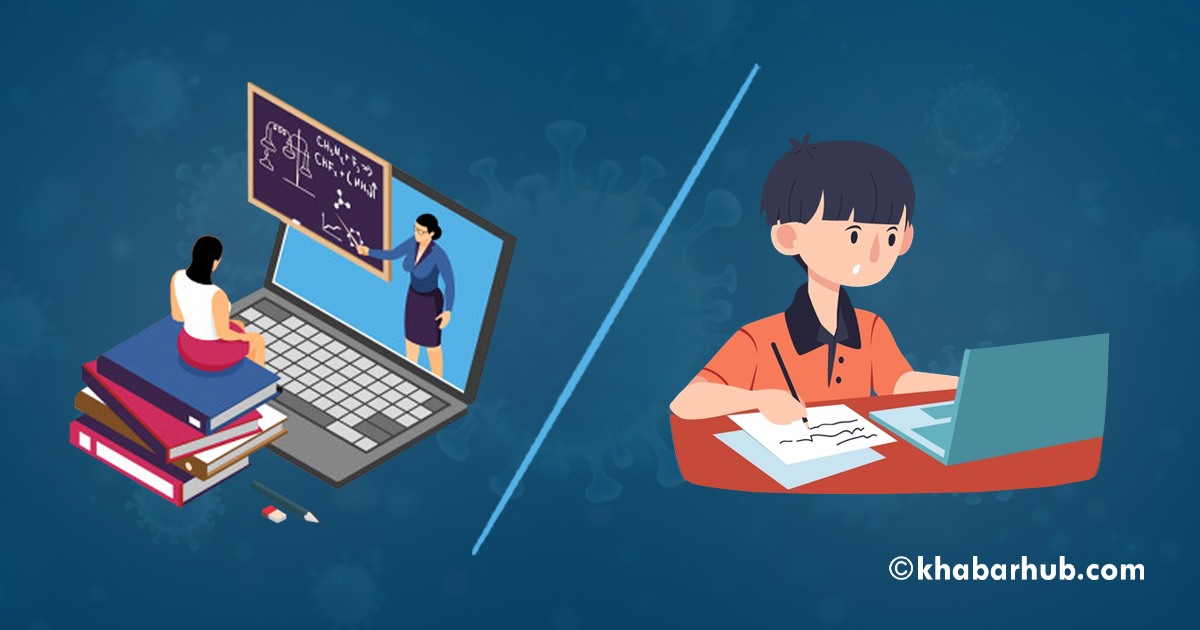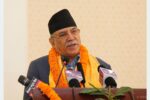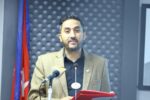KATHMANDU: With the schools, colleges and universities still shut down after the coronavirus pandemic outbreak, the new academic session is nearly paralyzed.
The COVID-19 has disturbed the education sector worse than the projection, and for school goers, 5 months of the new academic session are spent sans effective learning despite Education Ministry’s commitment to act not to let the session get wasted.
It’s now nearly 5 months of the new academic session for the school students, yet they are still unsure what to look at for their education ahead.
The Ministry of Education has finally decided to authenticate the virtual meeting so that the academic year would not go wasted.
Many schools in urban areas have run virtual classes nearly for three months now. Many organizations have arranged for the classes through radio and television as well.
However, the virtual classes are widely criticized as least effective especially for junior children.
Despite reports that alternative classes are in operation, the regulating ministry does not have the data about its effectiveness and accessibility.
In other words, the Ministry has not assessed whether this type of teaching-learning has really been effective.
It has no idea about the number of students addressed by such an alternative method of teaching-learning.
First hesitant about the effectiveness of alternative classes, after noticing that the formal operation of schools and colleges is likely to take still longer time, the Ministry is now preparing for an alternative method of teaching-learning.
The Ministry sources claim that they are discussing ‘Directives for the Facilitation of Students’ Learning Through Alternative Medium 2020” with various stakeholders.
The Ministry has prepared the directives exercising the rights granted by Clause 19 (A) of Education Act 2018.
Preparation of the Ministry
Realizing that the operation of normal time class could still be far from possible for some more time, the Ministry has decided to validate the alternative education.
Although the students of urban areas have been attending the virtual classes run by their schools, those in rural areas have no good access to electricity, computer, the internet, and the smartphones required to continue classes virtually.
Many students have been using the expensive data package from the telecom operators.
Not only the students, even the teachers are facing lots of problems due to a lack of access to the internet and the technology required to make virtual classes possible.
Hence, the concern now is, is it feasible to include all students in the alternative modes of teaching made the only way out for the continuation of the classes in such a crisis?
According to Deepak Sharma, the spokesperson of the Ministry of Education, Science and Technology, the recently published Directives for the Facilitation of Students’ Learning through Alternative Medium 2020 has clearly stated how to include the students lying beyond the access of all sorts of technology.
“The textbooks will be designed and provided identifying the number of students continuing their education in this academic year,” Spokesperson Sharma told Khabarhub.
According to the Directives, the Education and Human Resource Development Center (EHRDC) will prepare an electric copy of the self-study material and upload it on the website and the province and local government, in coordination with EHRDC, will publish and provide the study materials to the schools.
The local levels are assigned to print and distribute the exercise books required to the students.
Similarly, it states that the learning centers in the community or schools will arrange for the audio-visual classes ensuring social distancing while attending such courses as well.
Talking about the role of the teachers, spokesperson Sharma says that the teachers have to facilitate the learning by helping the students with the issues of things the latter could not comprehend while attending audio-visual classes.
Virtual class confined to 800 thousand students
There are nearly 7.1 million students up to grade 10 in schools. However, it is estimated that hardly 800 thousand are attending virtual classes.
Private and Boarding School’s Organization (PABSON) says that the 3-month long experience with teaching-learning via virtual class has not been effective.
“The pandemic panicked parents who had been to their home districts are still unable to come back due to the continuation of lockdown and prohibitory orders of in most part of the country,” Tika Ram Puri, the President of PABSON said.
“The government’s confusion on the registration or enrollment for new academic session confused the people as well,” he added.
The government not only postponed the registration schedule but directed the schools running classes to stop it and ordered the parents not to pay for online classes as well.
Puri thinks the government should appeal to the parents and ask them to get their wards enrolled for the academic session to make the classes effective.
The session should be prolonged up to June
The National Private and Boarding School’s Association, Nepal (NPABSON) claims that 40% of the students of the urban schools are now back home to their villages.
NPABSON President Ritu Raj Sapkota told Khabarhub that the government should take initiative in enhancing the participation in virtual classes.
“The government should tell the guardians and students clearly that the academic session will be run virtually,” Sapkota told Khabarhub, “The government should tell that as the virtual classes are the only means for learning for this session, all should join compulsorily.”
Although the provisions demand that the school should run at least 220 days in an academic year, most of the schools complete the session within 200 days.
This time too, the academic session could be complete by Mid April. Had the schools been opened, the session could have been completed by April.
Generally, the academic session in school starts in Mid April and ends by next the end of March. However, the classes have not started yet.
Provided the attendance of all students is ensured in the virtual classes, the academic session will not go wasted. Otherwise, with the passage of time, one valuable year of the energetic and high potential students will be wasted.









Comment